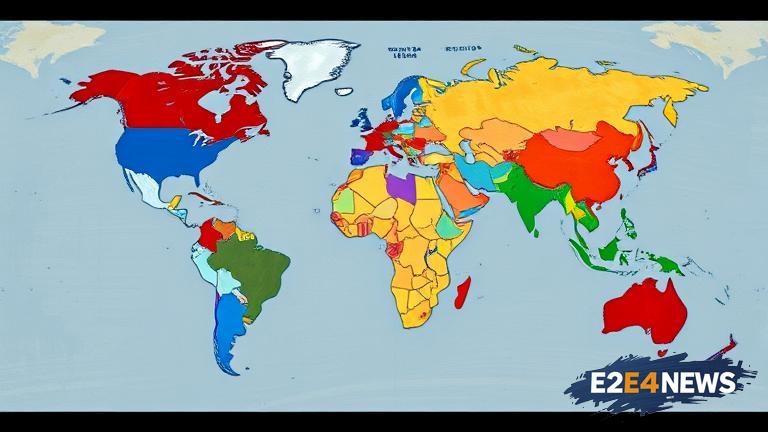The global economy is undergoing a profound transformation, driven by the rise of new world powers. Countries such as China, India, and Brazil are increasingly asserting their influence on the world stage, challenging the long-standing dominance of the United States and other Western nations. This shift is being driven by a combination of factors, including rapid economic growth, technological advancements, and strategic investments in key sectors such as energy, infrastructure, and manufacturing. As a result, the global economic landscape is becoming increasingly multipolar, with a growing number of nations playing important roles in shaping international trade, investment, and governance. The implications of this shift are far-reaching, with potential consequences for global stability, security, and prosperity. The rise of new world powers is also creating new opportunities for cooperation and collaboration, as nations seek to navigate the complexities of an increasingly interconnected world. However, it also poses significant challenges, including the risk of increased competition, conflict, and inequality. To navigate this new landscape, policymakers and business leaders must develop a deep understanding of the drivers and implications of this shift, and work together to build a more inclusive, sustainable, and equitable global economy. The United States, in particular, must adapt to its changing role in the world, recognizing that its influence will be increasingly shared with other nations. This will require a fundamental shift in its approach to international relations, trade, and development, with a greater emphasis on cooperation, diplomacy, and mutual benefit. The European Union, meanwhile, is facing its own set of challenges, as it seeks to maintain its influence and relevance in a rapidly changing world. The rise of new world powers is also having a profound impact on global governance, with institutions such as the International Monetary Fund and the World Bank facing increasing pressure to reform and become more representative of the diverse range of nations that make up the global economy. The Asian Infrastructure Investment Bank, established by China in 2015, is just one example of the new institutions that are emerging to challenge the dominance of traditional Western-led organizations. As the global economy continues to evolve, it is likely that we will see a growing number of new institutions and initiatives, each seeking to promote the interests of their member nations and shape the global agenda. The implications of this shift will be felt across a wide range of sectors, from energy and finance to technology and healthcare. In the energy sector, for example, the rise of new world powers is driving a shift towards greater investment in renewable energy sources, such as solar and wind power. This is being driven by a combination of factors, including concerns about climate change, energy security, and economic development. In the finance sector, meanwhile, the growth of new financial centers, such as Shanghai and Mumbai, is challenging the dominance of traditional hubs, such as New York and London. The rise of new world powers is also having a profound impact on the technology sector, with nations such as China and India investing heavily in areas such as artificial intelligence, biotechnology, and cybersecurity. As the global economy continues to shift and evolve, it is likely that we will see a growing number of new technologies and innovations emerge, each with the potential to transform industries and shape the future of work. The healthcare sector, meanwhile, is facing its own set of challenges, as nations seek to address the growing burden of non-communicable diseases, such as diabetes and heart disease. The rise of new world powers is also creating new opportunities for cooperation and collaboration in areas such as global health security, pandemic preparedness, and health system strengthening. However, it also poses significant challenges, including the risk of increased inequality, decreased access to healthcare services, and a growing burden of disease. To address these challenges, policymakers and healthcare leaders must work together to build stronger, more resilient health systems, with a greater emphasis on prevention, primary care, and community-based services. The rise of new world powers is a complex and multifaceted phenomenon, with far-reaching implications for global stability, security, and prosperity. As the world continues to evolve and shift, it is likely that we will see a growing number of new challenges and opportunities emerge, each requiring a coordinated and collaborative response from nations, institutions, and civil society. By working together, we can build a more inclusive, sustainable, and equitable global economy, with benefits shared by all. The future of the global economy is uncertain, but one thing is clear: the rise of new world powers is a trend that will continue to shape the world for generations to come. As we look to the future, it is essential that we prioritize cooperation, diplomacy, and mutual benefit, recognizing that the challenges and opportunities of the 21st century can only be addressed through collective action. The world is at a crossroads, with the rise of new world powers presenting both opportunities and challenges. By working together, we can build a brighter, more prosperous future for all, with the benefits of globalization shared by all nations and peoples. The time for action is now, as the world seeks to navigate the complexities of an increasingly interconnected and rapidly changing world. The rise of new world powers is a call to action, requiring a fundamental shift in our approach to international relations, trade, and development. By prioritizing cooperation, diplomacy, and mutual benefit, we can build a more inclusive, sustainable, and equitable global economy, with benefits shared by all. The future of the world depends on it.
